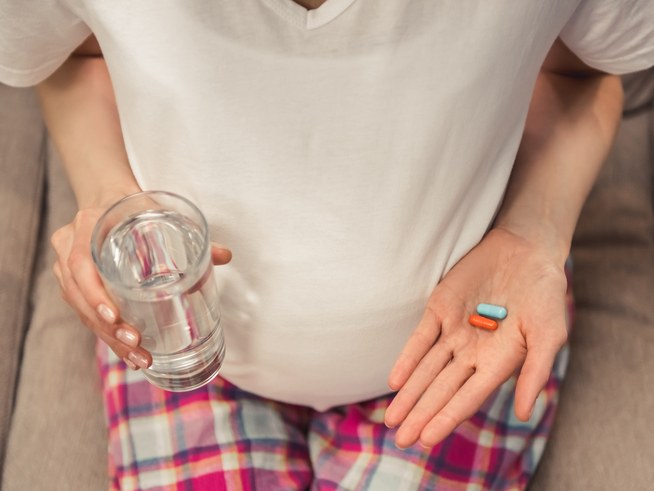What You Need to Know About Antidepressant Use During Pregnancy

It's something that not many new moms discuss but many have dealt with privately: antidepressants and pregnancy. Actress Amanda Seyfried, who had her baby in March, recently talked about it on the podcast Dr. Berlin’s Informed Pregnancy: “I didn’t get off my antidepressant. It’s really for anti-anxiety for me,” she said. “I’ve been taking Lexapro for years and years and years, and I didn’t get off of it. I was on an extremely low dose.” She added: “A healthy parent is a healthy kid.”
While some moms-to-be are nervous about staying on antidepressants during pregnancy, the research has shown that the risks of birth defects from antidepressant use are much lower than most people think.
A 2015 analysis by the Centers for Disease Control and Prevention looked at birth defects and selective serotonin reuptake inhibitors (SSRIs), which are popular medications used to treat mental health conditions like depression and anxiety. The study found that some birth defects, including brain and skull deformities and heart conditions, occur about two to three times more frequently in babies born to women who took certain types of SSRIs early in their pregnancy. That said, the actual risk of birth defects was still very low.
“It is really important to keep in mind that one in 33 babies is born with a birth defect, regardless of exposures during pregnancy,” Jennita Reefhuis, Ph.D., a research health scientist at the CDC who worked on the study, tells us. For each possible birth defect Reefhuis and her colleagues studied, the risk was very low, even when a pregnant woman was on antidepressants. For example, any woman’s chance of having a child with right ventricular outflow tract obstruction (a heart defect) is about 10 per 10,000 (or 0.1 percent). The results from the CDC study suggest that if a woman took paroxetine (aka Paxil) during her pregnancy, that risk could increase to 24 per 10,000 or 0.24 percent. While it's terrifying to hear that you may be two to three times more likely to have a baby with birth defects if you take antidepressants during pregnancy, it's important to remember that that’s the relative risk, meaning your risk compared to women who don’t take antidepressants during pregnancy. The absolute risk, i.e. how likely you actually are to have a baby with a birth defect, may still be under 1 percent.
Previous research found links between an increased risk of birth defects and antidepressant use during pregnancy, but the CDC study only found links for two of those drugs: fluoxetine (aka Prozac) and paroxetine. And again, the absolute risks associated with these drugs are still low, the authors write in the study. Reefhuis points out that her team wasn’t able to find any links between an increased risk of birth defects and sertraline (aka Zoloft). That is “especially reassuring given the fact that it is the SSRI that was most commonly used among mothers who had a child without a major birth defect,” she says.
Some research has shown that there may be an increased risk in the development of autism in babies born to moms who have taken antidepressants during pregnancy, including an observational study in BMJ, while others have found no link. In the latest study, 4 percent of children who were exposed to antidepressants during pregnancy were diagnosed with autism, compared to 3 percent of children born to mothers who did not use antidepressants during pregnancy but did have a history of a psychiatric disorder. “The relative risk is not zero, but it is low,” James J. Galligan, Ph.D., a professor of pharmacology and toxicology and director of the neuroscience program at Michigan State University, tells.
Ultimately, the decision to stay on antidepressants, lower the dose, or stop them entirely will be up to the mother and her doctor. However, stopping your medication without doctor supervision is not recommended.
“I can’t tell you how many times I see patients that have taken themselves off of one or more medications and come to me with no treatment because they’ve been told they can’t be on anything during pregnancy,” says Alison G. Cahill, M.D., chief of maternal fetal medicine at Washington University in St. Louis, and an expert on medication use during pregnancy. “It’s a myth that we want to debunk.”
Abruptly going off antidepressants is risky. “Some SSRIs can be so difficult to withdraw from suddenly that people can feel sick,” says licensed clinical psychologist Alicia H. Clark, Psy.D.. Withdrawal symptoms from Cymbalta, for example, can be so severe that it’s recommended that people go through a medically supervised withdrawal that can take weeks. (People can suffer from “brain zaps,” i.e. electric shock sensations, nightmares, anxiety, and vomiting, among other things.) “Add pregnancy to an already challenging withdrawal, and it can be risky,” she says.
Another important factor to consider when analyzing the risks associated with antidepressant use during pregnancy: the health of the mother.
Depression is real and it affects nearly 7 percent of the population, according to the Anxiety and Depression Association of America. To go untreated for depression during pregnancy can have serious consequences for you, too. That's why it's important to have an open and ongoing discussion with your doctor about your mental health, your medication use, and the health of your baby.
“While there are small risks with the use of antidepressants during pregnancy, there are nearly equal risks to the baby’s health when a pregnant mom has untreated depression,” Galligan says.
“Many of my patients require medication for their illnesses, and anxiety and depression are real illnesses,” Dr. Cahill says. “It always concerns me when patients receive the message that they shouldn’t be on any medication during pregnancy.”
Source: http://www.self.com/story/antidepressant-use-during-pregnancy